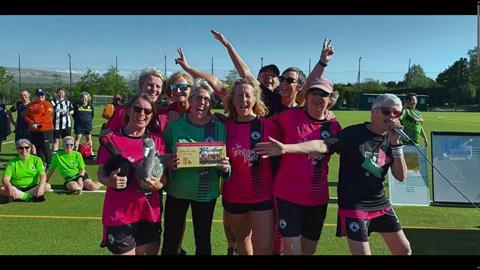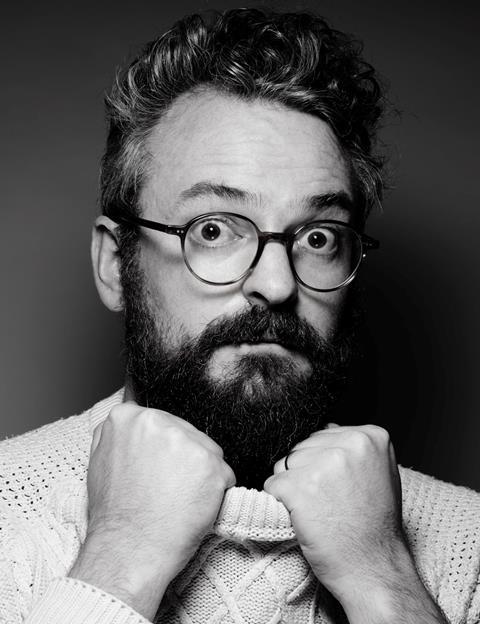AXA and Nonsense reveal the strategy behind their women’s walking football content

Insurance company AXA recently worked with agency Nonsense to produce a nine-minute documentary on a women’s walking football team made up of cancer survivors from across the UK, named Kicking Cancer: The World’s Toughest Football Team.
While AXA has a number of high-profile sponsorships, such as with Premier League and WSL side Liverpool and the recent Women’s Euros, this saw it concentrate on a grassroots side with some incredible stories. Along with video content, there is also press coverage and funding to clubs for taster sessions, kit, and more. Nonsense founder and strategy partner Rob Mosley told Broadcast Sport, “We knew that by focusing on women’s walking football, there’d be rich storytelling to be done.”

Women’s walking football has been a focus for AXA, and it brings with it the chance to grow with the sport that isn’t neccesarily there when working with established leagues and tournaments. AXA UK’s brand and sponsorship lead, Nathan Ashfield, noted, “The women’s game at the top level isn’t dramatically different from the men’s, but at the grassroots level it can be. As the sport grows, it’s great to grow with it. They’re so keen to work with us and have that attention, and it makes it really easy to work them.”
That eagerness can translate into wins, with AXA UK brand and sponsorship executive Zoe Tidd explaining, “Within the football community they’re so eager to spread the word about AXA, they’re doing their own press write-ups in their own magazines, and their own social posts all on behalf of AXA. It’s incredible word of mouth.”

This grassroots enthusiasm is boosted by the likes of the Kicking Cancer documentary, a highly-polished documentary that is also made with the purpose of getting more people into the sport, rather than overly promoting the AXA brand. Tidd said, “Any brand that’s seen to be supporting women’s football needs to be acting with purpose rather than just plastering their logo in.”
Women’s sport fans are far more likely to remember associated brands, but, she added, “Women’s sport fans tend to support brands that reflect their values. When a brand aligns with what they believe in, it makes a big difference in whether they choose to support it and remain loyal over time.”
AXA’s work with women’s walking football hadn’t been a main feature of its content to date, and Nonsense saw this as an opportunity. Mosley said,
“It’s quite rare for us to come across a brand that is doing something at a grassroots level and not shouting about it already. It wasn’t a huge leap to say, ‘well, we could make that what we talk about during the Women’s Euros.’”

The inspiring stories of the players themselves, who formed this team after winning battles with cancer, meant there was plenty to cover, and, “It also helps that there’s loads of fun stuff to point the camera at as well. They’re playing a game that they love and the vibes between them are electric,” Mosley added.
The key strategy became making sure this made it to audiences unfiltered. Mosley expained, “Clients and agencies are often under a lot of pressure to do things with mass appeal and there would always be someone in a meeting who might say, ‘well, what about men? Can we involve them?’ Or, ‘what about making it shorter so that it will get a higher view through rate?’ You do have to make some compromises, but if you hold off enough of that, you will end up with something as beautiful as the thing that we made.”
In this case, AXA and Nonsense pushed for a quality finish, with YouTube set to be the home of the documentary, but that isn’t aways the case. Ashfield said, “A really interesting challenge for us, as it is for many brands, is getting the balance right between something which is high quality and looks great and something that feels right for the platform.
“On TikTok, if it looks too polished, people will ignore it because they love that natural look and feel of self-shot or quite raw content.
“On the right channel, like YouTube, the quality really makes a difference to the look and feel of the [Kicking Cancer] film and the seriousness of the subject matter as well, because that’s really important to reinforce.”
Mosley agreed, adding that quality doesn’t neccesarily relate to picture and audio, “We think of production values, but sometimes it is more about how much research you do behind the scenes to find a really great story, or to build a relationship with someone to the point where they will shoot user generated footage for you, which is perfect for TikTok.
“You’re not investing the money in an awesome soundtrack and brilliant editing and grading, but you might be investing it elsewhere in the production process to get yourself brilliant quality.”
AXA is looking to build on this first step, Ashfield revealing, “We’re keeping in touch with the clubs who are running taster sessions at the moment, and hopefully we can find one or two success stories to create some nice social content to bang the drum of, ‘Look how accessible this sport is, and how much it can change your life.’”
This long term approach is what AXA is aiming for, and, for Mosley, what brands should be aiming for. “Where brands make a mistake is the belief that they can dip in and out and have an effect.”





No comments yet